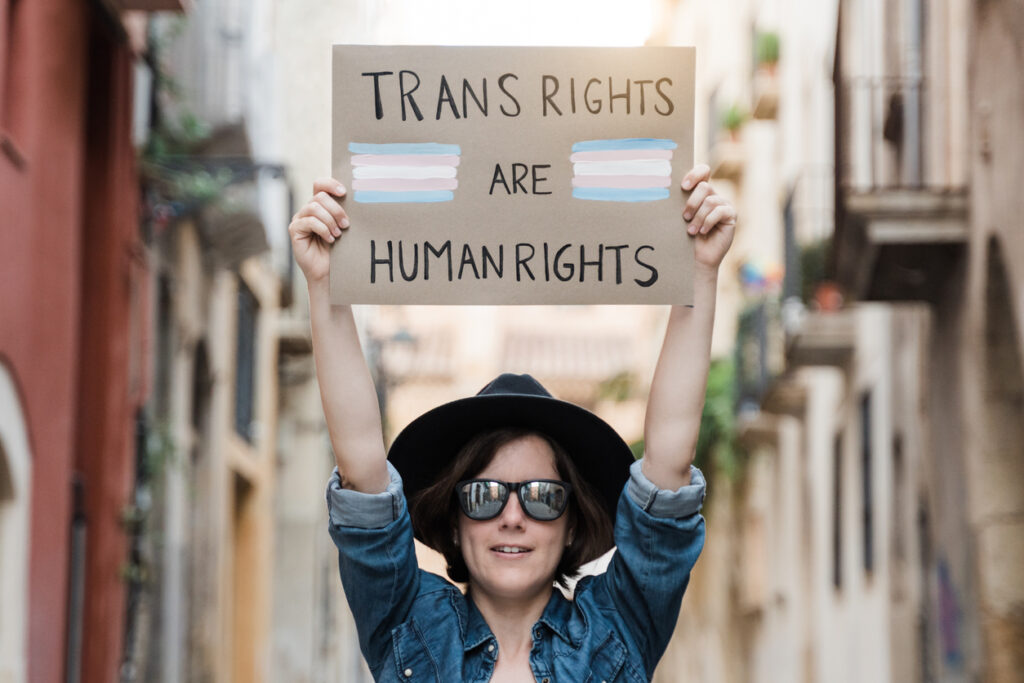In October, Netflix employees and activists staged a walkout and protest following the release of comedian Dave Chappelle’s latest Netflix special, The Closer. Chappelle makes several transphobic remarks throughout the show, including stating that “gender is a fact”, as well as offering his support to JK Rowling – who has previously been accused of transphobia – by claiming to be “team TERF”: an acronym for trans-excluding radical feminist, which is often used to describe Rowling.
Netflix then suspended a trans worker who tweeted criticism of the special, but later reversed the suspension. As a result, the transgender employee resources group behind the walkout sent a list of demands to Netflix, including funding for trans creators, recruiting more diverse employees and flagging anti-trans content on the platform.
There are several key lessons to be learned from the way Netflix handled the scandal, which HR professionals can take away. Trans activists and ambassadors voice their thoughts on the walkout, offering advice on prevention and response to isolating individual groups.
Employees need to know they have people to turn to when things go wrong and to know that they will be taken seriously, not dismissed.
Birmingham Pride head of communications and engagement, Eva Echo
What went wrong for Netflix?
Netflix handled it terribly, which only fuelled the frustration and anger felt by many employees. Given the political climate, especially in the US and UK, with trans rights being rolled back or attacked, HR should have exercised more diplomacy and taken the chance to assess whether something they commissioned was in line with its core values.
Netflix offered little support for employees who walked out – especially as they sacked the person organising the walkout. They have since claimed it was for other reasons, but these reasons are so far unproven, and there has been no disciplinary hearing; they have just fired them. Being conscious of the fact that tensions were high, there should have been more transparency in their approach.
Knowing the content of The Closer and that it was such a divisive issue, Netflix should have exercised caution and involved its own trans employees from the outset. Claiming to support their trans employees yet publicly backing Dave Chappelle’s special was disrespectful and a complete failure to those employees.
Employees stand united over many issues and we live in a time where the companies need staff more, not the other way round. Often seen as the mediator, HR departments need to listen to employees and not be afraid to challenge management. HR doesn’t exist to enforce the opinions of the board or senior management. Employees need to know they have people to turn to when things go wrong and to know that they will be taken seriously, not dismissed.
The key message is that LGBTQ+ people, especially trans people, need a safe environment in which to work. We face oppression, criticism and barriers in all aspects of our lives, the last thing we need is to experience it in the workplace, which ultimately puts more pressure on trans people who rely on that job to support themselves and their families.
Businesses need to understand that whatever their output is, be it media or a physical product, it needs to reflect the value of the employees too. When a large number of employees object, then listen. Don’t side with one person simply because they bring in revenue. So many people cannot be wrong or ignored.
Businesses can ensure they don’t make the same mistakes through thorough vetting and background checks, which would ensure that people like Dave Chappelle aren’t employed/featured in the first place. With so many people openly airing their views on social media, those checks would flag any issues right from the start.
Diversity and inclusion leader, Leng Montgomery
How should businesses be supporting trans employees and the greater community?
Netflix should look to improve the diversity amongst the decision-makers and those in charge of what is broadcast and commissioned, as well as providing more clarity on the exact type of content that they will be releasing. It should provide content standards on what it does and doesn’t consider harmful or hateful to an audience.
It needs to provide clear spaces and opportunities to listen to employees, as well as look at what its own policies and principles are in terms of trans awareness.
Employees will make a stance if there isn’t the correct accountability. If a company falls into disrepute or causes harm or trauma to a group of people, then there will be consequences. Fostering an open and inclusive culture means that it’s critical to work with the people that are representative of colleagues and your customer base to ensure that it is fostering an inclusive way of working.
Businesses should actively work with trans and LGBT+ professionals and ensure that their employees receive adequate learnings, which will enable them to identify and empathise with each other more effectively. If places want people to bring their whole selves to work or be representative of society, then it means adjusting and building more equity and inclusion into how it operates.
They won’t get it right all of the time, but working to be more inclusive is a good step, especially if representation and accountability is lacking.
Transgender ambassador, Scarlet Marie Davey Morgan
What are the key takeaways from the Netflix walkout?
Listen, learn, and make a change. People are so scared to ruffle a few feathers. If you stand and protect LGBTQ+ individuals and upset someone while doing so, that person is not someone you want working for you. You have to ruffle a few feathers to get a feather boa and put on a show.
A word of advice to companies: do not get left behind. The next generation is coming, and its people identify as LGBTQ+; these people intend to become bosses, upper management, and CEOs.
HR professionals need to have policies in place to support diverse people in the workplace by having gender-neutral facilities, a diversity, equity, and inclusion team.
BelieveGlobalCIC director, Joanne Monck
HR professionals need to be aware of the issues that people from diverse groups face. The Equality Act covers nine different groups of people, and it is illegal to discriminate against them.
HR professionals need to have policies in place to support diverse people in the workplace by having gender-neutral facilities, a diversity, equity, and inclusion team (DEI), and a space to talk and feel safe in their place of work and not feel that when they come out of work, they are going to be pushed aside.
How can businesses learn from this and stand with the trans and LGBTQ+ community?
- DEI in an organisation has to be led from the top down.
- Learn about unconscious bias and how it affects people. It needs to be mandatory. It is usually peer taught and is a fear of something an individual doesn’t believe as being the norm. But through teaching and training, it can be controlled.
- Look carefully at existing microaggressions and how they affect different groups of people; for example, passing comments that might make an individual feel threatened or worried.
- Organisations need to support social groups and charities like Pride – but 24/7, 365 days a year, not just jumping on the bandwagon and rainbow washing.
- Have suitable networks available in the workplace. For LGBTQ+, and particularly the trans community, it is important to have allies – people aware of what they are going through and who are able to support and talk to them. They should be able to talk to their colleagues and tell them what is going on and what needs to change.
Interested in this topic? Read Remember, remember, the 20th of November.
[cm_form form_id=’cm_65a14c3f5da64′]







One Response
This article has totally
This article has totally ignored the fact that many people believe there is a direct conflict between trans rights and womens and lesbians rights. What about the large number of people who agree with Dave Chapelle that there has to be some discussion? If you engage in these politics in the workplace you will alienate one half of your workforce or spend all your time running from one group to another trying to appease everyone.
Suggesting that Netflix doesn’t provide controversial content is really not the answer. That’s cancel culture. It’s censorship.